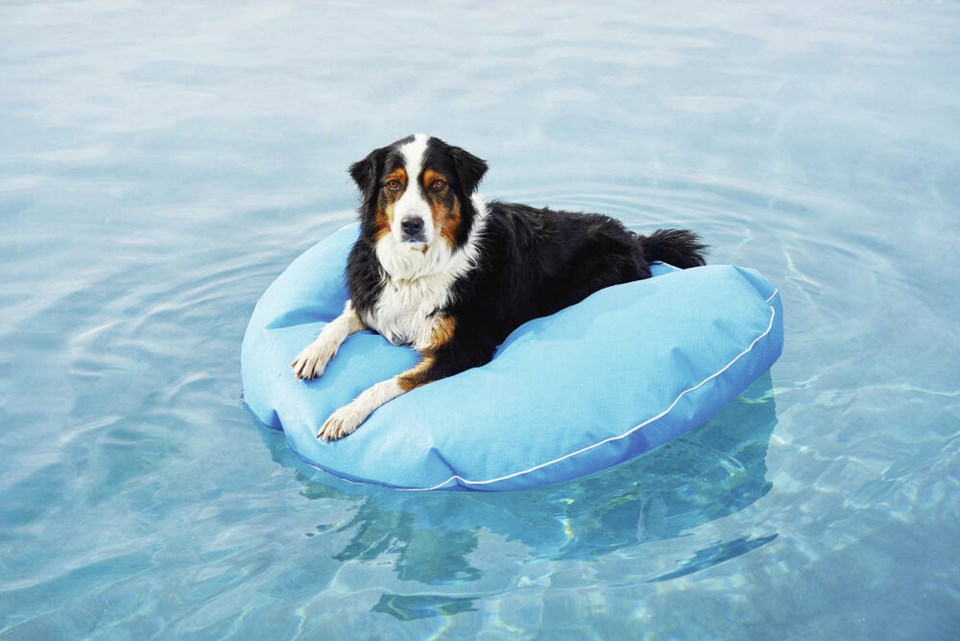As temperatures soar, the B.C. SPCA is advising dog owners to leave the animals in a cool spot at home — and never leave them alone in a vehicle.
”We know people love their animals, but they often don’t understand how quickly something can happen, even when they park in the shade or have their windows rolled down,” said Lorie Chortyk, manager of community relations for the animal-welfare organization.
Chortyk said dogs’ body temperature rise rapidly and they can go into distress very quickly. “The only way they can get relief is through panting or the pads on their feet. Everyone knows how hot it can be sitting in a parked car on a hot day.”
Calls to the SPCA’s hotline for pets in cars are rising as temperatures head into the 30s. Of the 408 calls to the line since January, 368 have come in the last month.
Chortyk said there were more calls last year at this time, but by this point in 2021, the province had already experienced June’s 40 C heat dome and sustained high temperatures through July. In total, last year, the BC SPCA received 1,083 calls to rescue pets in cars.
There have been 21 calls for dog rescues from vehicles so far in Victoria this year, 16 in Courtenay, nine in Nanaimo and six each in Langford and Duncan. Animal control officers and police have also responded to three calls in Sooke and two in Cobble Hill, as well as single calls in Sidney, North Saanich, Esquimalt, Brentwood Bay and Comox.
The B.C. SPCA hotline — 1-855-622-7722 — dispatches SPCA officers, animal control officers, RCMP and other agencies.
Chortyk said people who discover pets in hot cars should not break vehicle windows to rescue the pet “because they will find themselves on the wrong side the law.”
Chortyk said response times are usually very quick and decisions on rescuing animals should be left to animal control officers or police.
In the meantime, if you can, reach into an open window and supply some water or a soaked towel to cover the pet. But be careful, as the dog may be in distress and bite.
The B.C. SPCA says pet owners should never leave their furry friends unattended in a car even if the vehicle is electric and the air conditioning is on. It says a dog left in a hot car can die in just 10 minutes.
Chortyk said the organization records one or two pet deaths every summer in B.C. “And that’s too many because it’s such a preventable tragedy.”
Tips to keep pets safe and happy this summer:
• Plan ahead and leave pets at home when out running errands.
• If you leave windows open to bring cool air into your home, ensure they have a secure, locking screen to prevent your dog or cat from escaping or accidentally falling through.
• If your pet has free reign in the home when you’re out, keep doors open to darker and cooler areas — like the bathrooms or basement — so they have a cool place to hang out.
• If your dog is in a crate while you’re out, put the crate in a cool room and consider purchasing a cooling mat to place inside. These mats are made of a special kind of cooling gel that’s activated by the pressure of your pet’s body.
• An ample supply of fresh water should always be available.
• Get outdoors but avoid the midday heat. Walk in the early morning and later in the evening when temperatures are lower. Consider walking on a trail, preferably with lots of trees to provide additional shade, since walking on a hot sidewalk can burn a dog’s sensitive foot pads.
• At barbecues and get-togethers, ensure your pets are not ingesting snacks they shouldn’t have. Foods like raisins, grapes, onions, chocolate and products with the sweetener xylitol can be deadly for pets.
• Shaving off a dog or cat’s fur to help them stay cool can have the opposite effect, depending on the breed. Many animals’ coats are designed to be an insulator, keeping the cool air close to the skin when temperatures rise. Shaving off all (or most) of their fur also removes their skin’s first-line defence against sunburns, twigs and other hazards. Rather than shaving, a little trim and some regular brushing to help increase air circulation should do the trick.
>>> To comment on this article, write a letter to the editor: [email protected]




